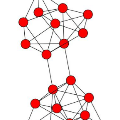Name ambiguity is common in academic digital libraries, such as multiple authors having the same name. This creates challenges for academic data management and analysis, thus name disambiguation becomes necessary. The procedure of name disambiguation is to divide publications with the same name into different groups, each group belonging to a unique author. A large amount of attribute information in publications makes traditional methods fall into the quagmire of feature selection. These methods always select attributes artificially and equally, which usually causes a negative impact on accuracy. The proposed method is mainly based on representation learning for heterogeneous networks and clustering and exploits the self-attention technology to solve the problem. The presentation of publications is a synthesis of structural and semantic representations. The structural representation is obtained by meta-path-based sampling and a skip-gram-based embedding method, and meta-path level attention is introduced to automatically learn the weight of each feature. The semantic representation is generated using NLP tools. Our proposal performs better in terms of name disambiguation accuracy compared with baselines and the ablation experiments demonstrate the improvement by feature selection and the meta-path level attention in our method. The experimental results show the superiority of our new method for capturing the most attributes from publications and reducing the impact of redundant information.
翻译:在学术数字图书馆中,姓名的模糊性是常见的,例如多位作者同名的学术数字图书馆。这给学术数据管理和分析带来了挑战,因此也有必要出现名称模糊性。名称模糊性的程序是将同名出版物分为不同组,每个组属于一个独特的作者。出版物中的大量属性信息使传统方法落到特征选择的边缘。这些方法总是人工和平等地选择属性,通常对准确性产生消极影响。拟议方法主要基于不同网络和集群的代表性学习,并利用自我注意技术解决问题。出版物的表述是结构和语义表达的合成。结构代表是通过基于元式的抽样和基于跳格的嵌入法获得的结构性代表,并引入了对自动了解每个特征的重量的注意。语义表达方式是使用NLP工具生成的。我们的提案在名称模糊性准确性与基线相比方面表现得更好,而相关实验则通过特征选择和元相关注程度的实验来显示改进。通过我们方法的元正位选择和元相关注程度的演示。实验结果显示我们最富余性出版物的优势。



